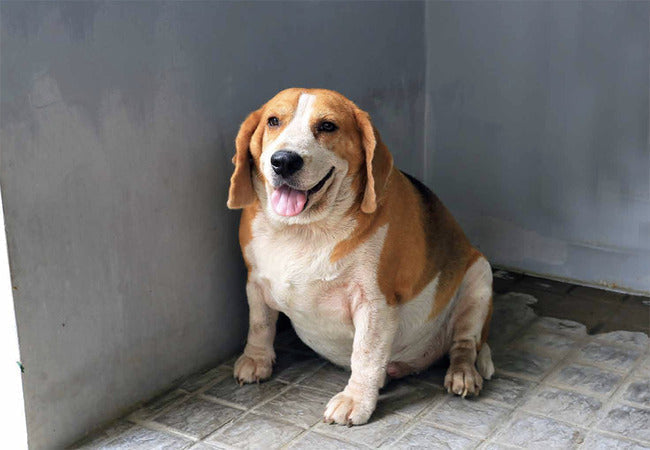2025 Vet Guide: Why Is My Dog Losing Weight? Causes, Diagnosis & Care 🐶⚖️

In this article
2025 Vet Guide: Why Is My Dog Losing Weight? Causes, Diagnosis & Care 🐶⚖️
By Dr. Duncan Houston BVSc
Unexplained weight loss is often an early sign that something's wrong. From diet changes and stress to serious illnesses, this guide dives into the hows and whys, so you can take action sooner. 👇
🔍 1. Understanding Weight Loss
Weight loss occurs when your dog burns more calories than they consumes. Early or gradual weight loss can be overlooked, but persistent changes deserve attention.
🍽️ 2. Common (Benign) Causes
- Food changes: New food, spoiled kibble, or underfeeding.
- Poor appetite: From stress, dental pain, or environmental changes.
- Increased activity: Puppies, new exercise, and colder weather increase calorie needs.
- Reproduction: Pregnancy or nursing boosts energy requirements.
- Aging metabolism: Older dogs lose lean mass, leading to natural weight loss.
⚠️ 3. When to Be Concerned
Non-benign weight loss often comes with other signs—vomiting, diarrhea, excessive thirst or urination, coughing, changes in behavior or energy levels.
- Lost >10% body weight, or >2% per week.
- Puppies losing weight—never normal.
- Senior dogs with chronic illnesses showing decline.
🩺 4. Medical Causes of Weight Loss
- Dental disease: Pain while eating reduces intake.
- Parasites: Intestinal worms stealing nutrients.
- Gastrointestinal disorders: IBD, ulcers, malabsorption, blockages.
- Organ disease: Kidney, liver, or heart disease causing catabolism or nausea.
- Endocrine disorders: Diabetes, Addison’s, rare hyperthyroidism—metabolic upsets.
- Exocrine pancreatic insufficiency (EPI): Poor enzyme production leads to maldigestion and weight loss.
- Cancer: Tumors use energy and often reduce appetite.
- Infections: Chronic infections increase metabolic needs and can cause GI upset.
- Neuromuscular disease: Weakness or pain limits eating, causing muscle loss.
🔍 5. Diagnostic Approach
- Complete physical exam—including dental health, body condition scoring.
- Urinalysis and fecal exam to detect worms, parasites, and infection.
- Bloodwork: CBC, chemistry, thyroid, cortisol, and enzyme levels for EPI.
- Imaging (X-ray, ultrasound) for GI obstructions, organ changes, masses.
- Special tests: TLI for EPI, GI biopsy, or endoscopy if needed.
🏠 6. Treatment & Support
- Treat underlying condition: Deworming, dental care, managing diabetes, organ support, and cancer therapy.
- Dietary support: High-calorie, digestible diets; pancreatic enzyme supplements for EPI.
- Appetite stimulants: When intake remains low due to illness.
- Hydration and GI soothing: Fluids and bland meals as needed.
- Gradual weight gain: Aim for ~1–5% body weight per month under vet guidance.
🐶 7. Home Monitoring & Prevention
- Track weight weekly and note appetite, activity, stool, water intake.
- Use apps/tools:
Ask A Vet for triage and care guidance.
Woopf to log food intake, symptoms, and meds.
Purrz to follow trends and set reminders. - Maintain regular vet wellness exams; flag weight changes promptly.
📚 FAQs
Q: My dog is eating but losing weight—what now?
This can indicate maldigestion (EPI), parasites, or early organ disease—vet evaluation is essential.
Q: Is rapid weight loss dangerous?
Yes—especially >10% body weight in a short time. It may point to serious illness and needs urgent care.
Q: Can stress cause weight loss?
Yes, stress or anxiety can suppress appetite. But rule out physical causes first.
💬 Owner Insight
> “Our senior lab started losing weight despite eating well. Tests showed mild kidney disease—after diet change and meds, he’s stable and gaining.”
🏁 Final Thoughts from Dr Houston
Unexplained weight loss is often the first sign of hidden health issues. Early detection, targeted diagnostics, and tailored treatments help your dog regain health. With tools like Ask A Vet, Woopf, and Purrz, you can track changes and protect your dog’s well-being into 2025 and beyond. 💙🐾
Download the Ask A Vet app for weight-tracking support, symptom logging, and expert advice anytime. 📱
AskAVet.com – Supporting wellness, one pound at a time.






